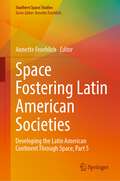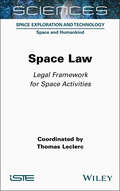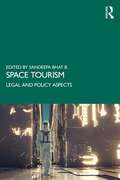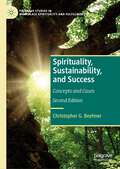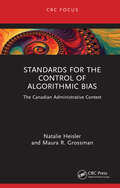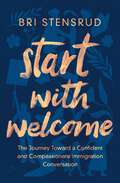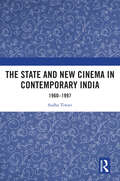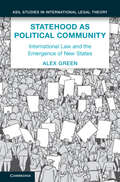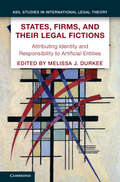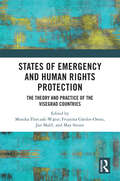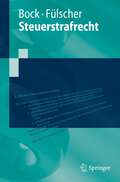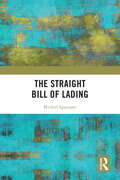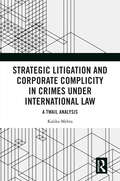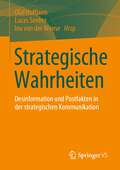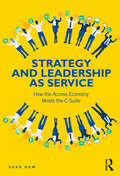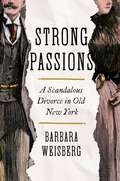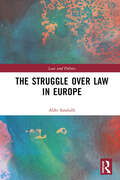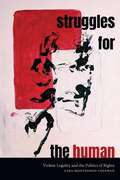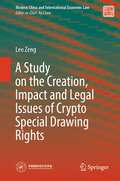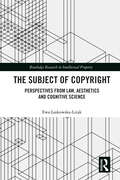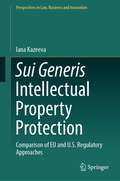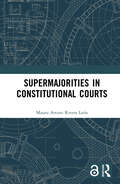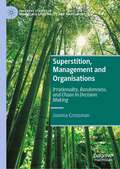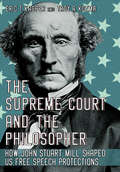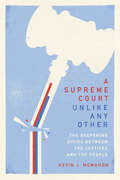- Table View
- List View
Space Fostering Latin American Societies: Developing the Latin American Continent Through Space, Part 5 (Southern Space Studies)
by Annette FroehlichThis peer-reviewed book presents a comprehensive overview of the role space is playing in enabling Latin America to fulfil its developmental aspirations. Following on from the highly acclaimed Parts 1 to 4, it explains how space and its applications can be used to support the development of the full range and diversity of Latin America societies, while being driven by Latin American goals. The Latin American space sector is currently undergoing a phase of rapid and dynamic expansion, with new actors entering the field and with space applications increasingly being used to support the continent’s social, economic, and political development. All across Latin America, attention is shifting to space as a fundamental part of the continental development agenda, and the creation of a Latin American space agency is evidence of this. Additionally, while in recent years, significant advances in economic and social development have lifted many of Latin America’s people out of poverty, there is still much that needs to be done to fulfil the basic needs of the population and to afford them the dignity they deserve. To this end, space is already being employed in diverse fields of human endeavour to serve Latin America’s goals for its future, but there is still a need for further incorporation of space systems and data. This book will appeal to researchers, professionals and students in fields such as space studies, international relations, governance, and social and rural development.
Space Law: Legal Framework for Space Activities
by Thomas LeclercOuter space is subject to a legal framework; there is a set of rules specifically dedicated to outer space and to the activities carried out there. These rules have developed since 1957, the year the first artificial satellite was launched. Major changes have also affected the technology used and the actors involved, as well as the domains concerned by the exploration and use of outer space. Space Law will lay out the progressive densification of the legal framework that is applicable to outer space and the activities that are carried out there. Without claiming to be exhaustive, the aim of this book is to present the main primary sources of space law, its main principles, the diversity of its fields of application and the challenges and issues that the development of space activities inevitably raises.
Space Tourism: Legal and Policy Aspects
by Bhat B. SandeepaSpace tourism has become extremely significant in recent times, especially in pursuance of the new space race among corporate giants such as Virgin Galactic, Blue Origin and SpaceX. Each of these corporate giants has already booked thousands of space enthusiasts for a journey to outer space. Given this wide interest of private space players, space tourists as well as countries in space tourism, it is imperative to understand the legal issues involved in space tourism. This book presents important discussions in the domain of space tourism and its legal implications across the globe. It attempts to find solutions to various challenges like safety and security in space, status of space tourists during emergencies, liability aspects, environmental protection, etc., faced during the recent spurt of space tourism. It also discusses the role of insurance in space tourism, various crimes possible in outer space with the rise of space tourism, the mechanisms for adjudication of such crimes, the aspect of quarantining space tourists, the need to preserve the natural and cultural heritage of space and other topics, besides examining the contemporary legal and policy-oriented issues of privatisation of space. A must read for scholars and researchers of law, space science, history and other fields who are interested in the space race and outer space law, this book will also be of interest to those exploring space studies, political studies, environmental studies and political economy. It will be useful for policymakers, bureaucrats, think tanks as well as interested general readers looking for fresh perspectives on the future of space
Spirituality, Sustainability, and Success: Concepts and Cases (Palgrave Studies in Workplace Spirituality and Fulfillment)
by Christopher G. BeehnerThis book offers a pragmatic approach to the benefits of spirituality and sustainability for both individual and organizational success. It introduces sustainability and workplace spirituality as contemporary solutions to the challenging organizational environment. The first few chapters introduce the fundamentals of spirituality, workplace spirituality, and sustainability. The author then demonstrates how the three qualities are beneficial in achieving personal and business success. Through the combination of synthesized research summaries and case studies of individuals and organizations, this book offers readers a fresh perspective on the importance of spirituality and sustainability to organizational performance.
Standards for the Control of Algorithmic Bias: The Canadian Administrative Context
by Natalie Heisler Maura R. GrossmanGovernments around the world use machine learning in automated decision-making systems for a broad range of functions. However, algorithmic bias in machine learning can result in automated decisions that produce disparate impact and may compromise Charter guarantees of substantive equality. This book seeks to answer the question: what standards should be applied to machine learning to mitigate disparate impact in government use of automated decision-making? The regulatory landscape for automated decision-making, in Canada and across the world, is far from settled. Legislative and policy models are emerging, and the role of standards is evolving to support regulatory objectives. While acknowledging the contributions of leading standards development organizations, the authors argue that the rationale for standards must come from the law and that implementing such standards would help to reduce future complaints by, and would proactively enable human rights protections for, those subject to automated decision-making. The book presents a proposed standards framework for automated decision-making and provides recommendations for its implementation in the context of the government of Canada’s Directive on Automated Decision-Making. As such, this book can assist public agencies around the world in developing and deploying automated decision-making systems equitably as well as being of interest to businesses that utilize automated decision-making processes.
Start with Welcome: The Journey toward a Confident and Compassionate Immigration Conversation
by Bri StensrudYou've seen the headlines. You've watched the TV footage. People around the world are in dire situations and on the move. Current estimates suggest over 100 million people are forcibly displaced from their homes and seeking refuge in other countries. It seems as if everyone wants to come to the U.S., and if we're honest, that gives many of us pause.As Christians we're supposed to love our neighbor as ourselves. But we can't stop wondering if we showed welcome to the world, would it change our culture? Would it make us less safe? Would it be a drain on our taxes and local communities? Whether we realize it or not, our fears have trumped our faith. We fear those who seek a new life in our midst.So does the Bible have anything to say about immigration? Or is it just a political issue? Is it a pro-life issue? Where does this all fit in my faith and worldview?You have questions. You have fears. But you also have compassion.So, let's start there.Let's have the conversation you've always wanted to have about immigration. Let's ask hard questions and detangle from the easy talking points that still leave us curious about our calling. Let's attach confidence to your compassion.Get ready to dive into the whole of scripture to better understand what God calls us to do concerning immigrants and refugees. It's a journey, and I'm here to take it with you.In Start with Welcome, Bri Stensrud reveals that something is stirring in the American Church. Something much bigger than platforms, politics, and pundits. Something that could literally change the world.It all starts with one word: Welcome.
The State and New Cinema in Contemporary India: 1960–1997
by Sudha TiwariThis book examines the relationship between the newly independent Indian state and its New Cinema movement. It looks at state formative practices articulating themselves as cultural policy. It presents an institutional history of the Film Finance Corporation (FFC), later the National Film Development Corporation (NFDC), and their patronage of the New Cinema in India, from the 1960s to the 1990s, bringing into focus an extraordinary but neglected cultural moment in Indian film history and in the history of contemporary India. The chapters not only document the artistic pursuit of cinema, but also the emergence of a larger field where the market, political inclinations of the Indian state, and the more complex determinants of culture intersect — how the New Cinema movement faced external challenges from the industrial lobby and politicians, as well as experienced deep rifts from within. It also shows how the Emergency, the Janata Party regime, economic liberalization, and the opening of airwaves all left their impact on the New Cinema. The volume will be of great interest to scholars and researchers of film studies, politics and public policy, especially cultural policy, media and culture studies, and South Asian studies.
Statehood as Political Community: International Law and the Emergence of New States (ASIL Studies in International Legal Theory)
by null Alex GreenAlex Green argues that states arise under contemporary international law only when two abstract conditions are fulfilled. First, emerging states must constitute 'genuine political communities': collectives within which particular kinds of ethically valuable behaviour are possible. Second, such communities must emerge in a manner consistent with the ethical importance of individual political action. This uniquely 'Grotian' theory of state creation provides a clear legal framework comprising four factual 'antecedents' and five procedural principles, rendering the law of statehood both coherent and normatively attractive.
States, Firms, and Their Legal Fictions: Attributing Identity and Responsibility to Artificial Entities (ASIL Studies in International Legal Theory)
by Melissa J. DurkeeThis volume offers a new point of entry into questions about how the law conceives of states and firms. Because states and firms are fictitious constructs rather than products of evolutionary biology, the law dictates which acts should be attributed to each entity, and by which actors. Those legal decisions construct firms and states by attributing identity and consequences to them. As the volume shows, these legal decisions are often products of path dependence or conceptual metaphors like “personhood” that have expanded beyond their original uses. Focusing on attribution, the volume considers an array of questions about artificial entities that are usually divided into doctrinal siloes. These include questions about attribution of international legal responsibility to states and state-owned entities, transnational attribution of liabilities to firms, and attribution of identity rights to corporations. Durkee highlights the artificiality of doctrines that construct firms and states, and therefore their susceptibility to change.
States of Emergency and Human Rights Protection: The Theory and Practice of the Visegrad Countries
by Monika Florczak-Wątor, Fruzsina Gárdos-Orosz, Jan Malíř, and Max SteuerEmergencies are ubiquitous in 21st-century societal discourses. From the rise of emergency pronouncements in the United States since 9/11 accompanied by the associated violations of fundamental rights, through talks of ‘crises’ in the EU in relation to the economy, Putin’s occupation of Crimea (as recently amplified by the full-scale invasion of Ukraine) or refugees, to the long-neglected looming climate catastrophe, emergency discourses have been catapulted to the centre of attention by the critical juncture of the COVID-19 pandemic. This volume presents and compares the existing regulations and practices of emergencies and human rights protection in the Visegrad (V4) countries. As such, the analysis covers Czech Republic, Hungary, Poland, and Slovakia. Although these European countries share a common historical experience and are now members of the EU and NATO, they differ in some of their constitutional traditions and, also, in the dynamics of their political regimes. Divided into three parts, the first two comprehensively discuss the constitutional models of emergency and human rights protection in each of the V4 countries, while the third part illustrates how these models and the general framework of rights protection materialised in the limitations of the selected human rights during the COVID-19 pandemic. The volume provides a compass for more in-depth, comparative, and interdisciplinary inquiries into the forms and practices of emergencies in one of the EU regions that faces illiberalisation and the consequences of the ongoing invasion of Ukraine by the Russian Federation on its eastern borders. It will be a valuable resource for academics, researchers, and policymakers working in the areas of Constitutional Law and Politics.
Steuerstrafrecht (Springer-Lehrbuch)
by Dennis Bock Friedrich Sebastian FülscherDieses Buch enthält – insbesondere für Studierende, aber auch Berufseinsteiger – eine Einführung in das Steuerstrafrecht sowohl in materieller als auch verfahrensrechtlicher Hinsicht. Die Autoren aus Wissenschaft und Praxis verbinden ihre Erfahrungen zu einem mit zahlreichen Beispielsfällen (vornehmlich aus der aktuellen Rechtsprechung) versehenen Lehrwerk, welches sich zum Ziel setzt, eine auf den ersten Blick nicht leicht zugängliche Materie einprägsam darzustellen.
The Straight Bill of Lading
by Michiel SpanjaartThe bill of lading has been the subject of numerous articles, dissertations, and textbooks over the years, and this is hardly surprising. The bill of lading has a fascinating history, it has several functions with roots in both contract and property law, and its issuance may trigger the application of an international convention on the carriage of goods by sea, the Hague–Visby Rules. Whereas most books on the subject deal with the bill of lading in general, this book zooms in on the straight bill of lading and covers the differences (and similarities) with a negotiable (order or bearer) bill of lading.
Strategic Litigation and Corporate Complicity in Crimes Under International Law: A TWAIL Analysis
by Kalika MehtaThis book provides a comprehensive account of how non-state actors rely on international criminal law as a tool in the service of progressive political causes. The argument that international criminal law and its institutions serve as an instrument in the hands of a few powerful states, and that its practice is characterized by double standards and selectivity, has received considerable attention. This book, however, focuses on a practice that is informed by this argument. Its focus is on an alternative practice within international criminal law, where non-state actors navigate what critical scholars call a structurally biased legal system, in order to achieve long-term political objectives. Innovatively, the book combines the concerns expressed by Third World Approaches to International Law with strategic litigation that focuses on the accountability of corporations for their complicity in crimes under international law. Analysing this litigation, the book demonstrates that, while it is crucial to highlight the blind spots of the international criminal legal framework, it is also important to take into account the practice of non-state actors engaged in leveraging its emancipatory potential. This original analysis of the implementation and legitimacy of international criminal law will be of interest to a wide range of scholars and activists working in relevant areas of law, politics, criminology and international relations.
Strategische Wahrheiten: Desinformation und Postfakten in der strategischen Kommunikation
by Olaf Hoffjann Lucas Seeber Ina von der WenseStrategische Kommunikation zielt mit ihren kontingenten Wirklichkeitsbeschreibungen seit jeher auf gesellschaftliche Wahrheitsmodelle. Wie häufig gesellschaftliche Wahrheitsmodelle auf strategische Kommunikationsbemühungen zurückgehen, auf Unwahrhaftigkeit beruhen und damit zumindest zeitweise zu strategischen Wahrheiten werden, zeigen eindrucksvoll zwischenzeitlich geglaubte Wahrheiten, die sich als Lüge entpuppt haben: von Walter Ulbrichts „Niemand hat die Absicht, eine Mauer zu errichten“ über Hitlers Tagebücher bis hin zu den Massenvernichtungswaffen im Irak. Die erfolgreichen Kampagnen der Brexiteers und von Donald Trump 2016 haben diesem Thema zu neuer und bislang ungeahnter Aufmerksamkeit verholfen. Während die Themen Desinformation und postfaktische Gesellschaft die Journalismus-, politische Kommunikations- und Medienethikforschung aktuell zu dominieren scheinen, ist das Schweigen der deutschsprachigen und internationalen PR- und Organisationskommunikationsforschung auffällig. Dies ist umso bemerkenswerter, weil die PR-Wissenschaft in der Vergangenheit immer wieder versucht hat, ihren Gegenstand zu schärfen, indem sie sich am Begriff der Propaganda abgearbeitet hat. Daraus müsste eigentlich eine Affinität für das Thema Desinformation resultieren. Aber genau das Gegenteil ist offensichtlich der Fall: Hat sich die PR-Wissenschaft gerade deshalb nicht mit Desinformation beschäftigt, weil sie sich so dezidiert von Propaganda und darin eingeschlossenen desinformierenden und manipulativen Techniken abgrenzen will? Was sind die Gründe hierfür? Glauben wir, bereits alles zum Thema gesagt zu haben? Liegt dies daran, dass sich die PR- und Organisationskommunikationsforschung seit jeher vor allem für Unternehmen und weniger für politische und Non-Profit-Organisationen interessiert? Oder fühlen wir uns hier schlicht und ergreifend nicht zuständig? Es scheint offenkundig höchste Zeit zu sein, sich wieder eingehend mit Fragen der Desinformation aus der Perspektive der strategischen Kommunikationsforschung zu befassen. Die Beiträge des Tagungsbandes fokussieren hierzu auf neue theoretische Perspektiven, normative Bewertungen und empirische Befunde.
Strategy and Leadership as Service: How the Access Economy Meets the C-Suite
by Sara DawStrategy and Leadership as Service isn’t just a nice idea; it is a practical, alternative vision of the future of work for senior executives that is starting to gain significant interest and is being adopted by businesses globally. Disrupting and challenging the traditional full-time employment model, the Strategy and Leadership as Service framework provides businesses with access to the complete range of functional, emotional, and collective intelligence at the C-suite level by moving their positions from the “pay-roll” to an “access-role.”Many entrepreneurial and growing businesses don’t need, don’t want, and can’t afford full-time C-suite executives. For larger organisations, it is becoming harder to find the skills and knowledge required to fulfil all the obligations of a functional C-suite with a fixed group of individuals. By moving to the Strategy and Leadership as Service framework, the outcomes are better for all stakeholders: more engagement, access to the right skillsets and mindsets at the right time and in the right quantity to match the changing business agenda, more flexibility for senior leaders, and strengthened risk management. Through presenting a working business model, and real-world case studies throughout, this book provides executives and leaders with a complete understanding of this ground-breaking approach and its key benefits, the theory upon which it is based, its essential ingredients, the mindset change required and, most importantly, how to apply it in practice.The book provides business leaders, C-suite portfolio executives, human resource professionals, strategy consultants, leadership coaches, organisational development consultants, recruiters, professional service firms, academics, and forward-thinking business students with a radical new view of how the access economy can be applied to business strategy and leadership for more sustainable futures.
Strong Passions: A Scandalous Divorce in Old New York
by Barbara WeisbergShocking revelations of a wife’s adultery explode in an incendiary nineteenth-century trial, exposing upper-crust New York society and its secrets. What could possibly go wrong in a wealthy matriarch’s country home when her dilettante son, his restless wife, and his widowed brother live there together? Strong Passions, rooted in the beguiling times of Edith Wharton’s “old New York,” recounts the true story of a tumultuous marriage. In 1862, Mary Strong stunned her husband, Peter, by confessing to a two-year affair with his brother. Peter sued Mary for divorce for adultery—the only grounds in New York—but not before she accused him of forcing her into an abortion and having his own affair with the abortionist. She then kidnapped their young daughter and disappeared. The divorce trial Strong v. Strong riveted the nation during the final throes and aftermath of the Civil War, offering a shocking glimpse into the private world of New York’s powerful and privileged elite. Barbara Weisberg presents the chaotic courtroom and panoply of witnesses—governess, housekeeper, private detective, sisters-in-law, and many others—who provided contradictory and often salacious testimony. She then asks us to be the jury, deciding each spouse’s guilt and the possibility of a just resolution. Social history at its most intimate, Strong Passions charts a trial’s twists and turns to portray a family and country in turmoil as they faced conflicts over women’s changing roles, male custody of children, and men’s power—financial and otherwise—over wives.
The Struggle over Law in Europe (ISSN)
by Aldo SandulliThis book examines the role of law in Europe at a time when economic policies have become dominant not only on this continent but globally. Can law be seen as a mere infrastructure? Or does it contribute to defining the social and legal order through its own inherent rules? If the second hypothesis is true, what might these rules be, and how may they be identified? Lastly, to what extent can agreeing a definition of the role of law affect the future of Europe? With the Next Generation European Union, the EU has introduced an unprecedented investment plan for economic recovery and resilience. In doing so, it has become the most important financial intermediary on the continent. But is this simply the prelude to a European economic and financial revival, or does it also aim to strengthen the European legal order in social, political, and constitutional terms? This book argues that the role of law in Europe should be to achieve a balanced relationship between freedom and solidarity; encouraging economic competition, but also social cohesion. Analyzing the role of law in the project of European integration, it maintains that law should be more than an infrastructure for finance and economics, showing how it can act as a guide and a binding force to achieve a more balanced relationship between economics, politics, and law. This book will be of interest to scholars in the fields of public law, European law, law and economics, the philosophy of law, legal history, political theory, and political science, as well as others concerned with the future of European integration.
Struggles for the Human: Violent Legality and the Politics of Rights (Global and Insurgent Legalities)
by Lara Montesinos ColemanIn Struggles for the Human, Lara Montesinos Coleman blends ethnography, political philosophy, and critical theory to reorient debates on human rights through attention to understandings of legality, ethics, and humanity in anticapitalist and decolonial struggle. Drawing on her extensive involvement with grassroots social movements in Colombia, Coleman observes that mainstream expressions of human rights have become counterparts to capitalist violence, even as this discourse disavows capitalism’s deadly implications. She rejects claims that human rights are inherently tied to capitalism, liberalism, or colonialism, instead showing how human rights can be used to combat these forces. Coleman demonstrates that social justice struggles that are rooted in marginalized communities’ lived experiences can reframe human rights in order to challenge oppressive power structures and offer a blueprint for constructing alternative political economies. By examining the practice of redefining human rights away from abstract universals and contextualizing them within concrete struggles for justice, Coleman reveals the transformative potential of human rights and invites readers to question and reshape dominant legal and ethical narratives.
A Study on the Creation, Impact and Legal Issues of Crypto Special Drawing Rights (Modern China and International Economic Law)
by Leo ZengThis book analyzes the concept, theory, rules, and impact of the reform of the international monetary system and Crypto-SDRs and provides a feasibility analysis of the combination of blockchain technology and SDRs. It explores and summarizes the possibility of solving problems such as the inherent defects of the current international monetary system and creatively suggests that the birth of Crypto-SDR will have a positive impact on countries and industries and fields around the world, especially in anti-money laundering, cross-border asset recovery, international payments, banking, insurance, financial auditing, Fintech regulation, etc.
The Subject of Copyright: Perspectives from Law, Aesthetics and Cognitive Science (Routledge Research in Intellectual Property)
by Ewa Laskowska-LitakExploring the concept of copyright subject matter through the lenses of law, aesthetics and cognitive science, this book describes the historical evolution of a work into an artefact that qualifies as copyrightable subject matter. Discussing the originality requirement towards an artefactual understating of intangible goods, copyright’s present struggles with modern societies and technologies, and growing inequalities between rights holders and producers, the book adopts an interdisciplinary approach based on studies in law, aesthetics, neuroscience, and cognitive science to present a novel perspective on the non-artefactual and contextual identification of copyright subject matter. The book examines the challenges raised by aesthetic and neuroaesthetic concepts and cognitive studies, seeking to create a unifying framework of identification strategies for modern copyright law which embrace historical, philosophical and social perspectives, the book develops a research methodology that offers a new interdisciplinary and holistic approach for understanding the subject of copyright and better addressing the needs of modern society, technology and business models. Touching on normative understandings of creativity and legal-philosophical, aesthetic, and cognitive considerations with regard to the idea/expression dichotomy in copyright law, the book will be of immense interest to legal scholars, legal philosophers, aestheticians and neuroaestheticians.
Sui Generis Intellectual Property Protection: Comparison of EU and U.S. Regulatory Approaches (Perspectives in Law, Business and Innovation)
by Iana KazeevaThe standard forms of intellectual property protection, namely, copyright, patents, trademarks and trade secrets, have a long history and are well regulated in the legislative systems of most jurisdictions. However, there are specific kinds of subject matter that, due to their characteristics, cannot be adequately protected by these standard forms of intellectual property instruments. At the same time, these categories of subject matter require legal protection in order to ensure the balance between the public's access to these creations and the creators' rights. For these reasons, many jurisdictions introduce a special form of intellectual property protection, namely, sui generis regime, i.e., intellectual property legal regime “of its own kind”, designed to serve the specific needs of a particular subject matter. This book analyzes the intellectual property protection regimes in the EU and the U.S. available for three categories of subject matter that are often considered as requiring sui generis protection, namely, databases, designs and plant varieties. One of the main objectives is to evaluate whether the chosen subject matter in fact requires sui generis intellectual property protection and whether the introduced sui generis regimes have proved to be successful over time. The final chapter of this book analyses the perspectives of sui generis intellectual property protection for works generated by AI systems. This volume offers a comprehensive analysis of sui generis intellectual property rights and will be a key source for both scholars and practitioners with an interest in intellectual property law.
Supermajorities in Constitutional Courts
by Mauro Arturo Rivera LeónConstitutional adjudication is a subject of fascination for scholars. Judges may annul the will of a democratically elected Parliament in counter-majoritarian fashion. Although conceived as a remedy against majoritarianism, judges also decide cases by voting. Whether they do so through simple majorities or supermajorities is not trivial.The debate around supermajorities has awakened anew amidst theories of judicial limitation and new conceptions of judicial review. This book advances our knowledge of systems employing supermajorities in constitutional adjudication by performing a comparative analysis of ten jurisdictions and twelve supermajority models. It introduces a typology of the main models of institutional design, the reasons leading policymakers to establish them, and the impact supermajorities have on courts. It explores the question of whether supermajorities grant deference and foster consensus, or if they disable constitutional courts from exercising judicial review. By analyzing the history, practice, and effects of supermajority rules in courts, this book contributes to an ongoing conversation on the democratic implications of voting protocols in constitutional courts. It will be a valuable resource for policy-makers, scholars, and researchers working in the areas of comparative constitutional law and constitutional politics.The Open Access version of this book, available at http://www.taylorfrancis.com, has been made available under a Creative Commons Attribution (CC-BY) 4.0 license.
Superstition, Management and Organisations: Irrationality, Randomness, and Chaos in Decision Making (Palgrave Studies in Workplace Spirituality and Fulfillment)
by Joanna CrossmanThis book addresses how people and organisations sometimes respond to uncertainty in making decisions. Those decisions are rooted in beliefs and behaviours that are not always rational, especially in response to perceived randomness, chaos and unexpected circumstances. The author uses a transdisciplinary approach to the study of superstition in the context of business and management, taking care to acknowledge that what is regarded as superstition to one person may well be constructed as a spiritual belief by another. Respect and sensitivity in explicating individual and social constructions of spirituality is a core value in structuring the narrative of the text. The work also explores the interwoven relationships amongst superstition, religion, spirituality and empiricism and how cultural, political, economic and environmental factors are likely to influence organisations and those who are employed by them. Further, it examines the influence of beliefs related to topics such as feng shui, astrology, phrenology and the I Ching in recruitment. This comprehensive treatment of the role of superstition in business will advance the scholarly conversation on uncertainty in decision making. It points to the power of belief that defies empirical validation and how it can be used in a variety of contexts, such as the marketing of products and images to manipulate unwary consumers or inhibit the implementation of health advice in times of COVID-19.
The Supreme Court and the Philosopher: How John Stuart Mill Shaped US Free Speech Protections
by Eric T. Kasper Troy A. KozmaThe Supreme Court and the Philosopher illustrates how the modern US Supreme Court has increasingly adopted a view of the constitutional right to the freedom of expression that is classically liberal in nature, reflecting John Stuart Mill's reasoning in On Liberty. A landmark treatise outlining the merits of limiting governmental and social power over the individual, On Liberty advocates for a maximum protection of human freedom. Proceeding case by case and covering a wide array of issues, such as campaign finance, offensive speech, symbolic speech, commercial speech, online expression, and false statements, Eric T. Kasper and Troy A. Kozma show how the Supreme Court justices have struck down numerous laws for infringing on the freedom of expression.Kasper and Kozma demonstrate how the adoption of Mill's version of free speech began with Justice Oliver Wendell Holmes Jr. more than a century ago and expanded over time to become the prevailing position of the Court today. The authors argue that this embrace of Mill's rationale has led to an unmistakable reorientation in the Court's understanding of free expression jurisprudence.The Supreme Court and the Philosopher is the first book to comprehensively explore how the political philosophy of Mill has influenced the highest court in the land. In targeting the underlying philosophical reasons that explain why the modern Supreme Court renders its First Amendment decisions, this book is particularly timely, as the issues of censorship and freedom of expression are debated in the public square today.
A Supreme Court Unlike Any Other: The Deepening Divide Between the Justices and the People
by Kevin J. McMahonA data-rich examination of the US Supreme Court's unprecedented detachment from the democratic processes that buttress its legitimacy. Today’s Supreme Court is unlike any other in American history. This is not just because of its jurisprudence but also because the current Court has a tenuous relationship with the democratic processes that help establish its authority. Historically, this “democracy gap” was not nearly as severe as it is today. Simply put, past Supreme Courts were constructed in a fashion far more in line with the promise of democracy—that the people decide and the majority rules. Drawing on historical and contemporary data alongside a deep knowledge of court battles during presidencies ranging from FDR to Donald Trump, Kevin J. McMahon charts the developments that brought us here. McMahon offers insight into the altered politics of nominating and confirming justices, the shifting pool of Supreme Court hopefuls, and the increased salience of the Court in elections. A Supreme Court Unlike Any Other is an eye-opening account of today’s Court within the context of US history and the broader structure of contemporary politics.
